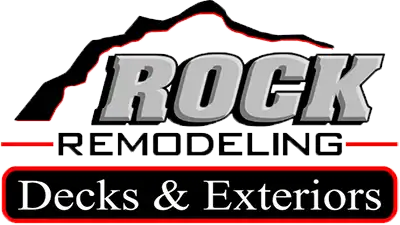A new deck is one of the best ways to enhance your outdoor living space, adding beauty, value, and functionality to your home. Whether you’re planning a simple ground-level deck or an elaborate multi-level retreat, it’s essential to understand what drives the cost.
Several factors determine the average cost, from the deck size to the type of material used. Rock Remodeling will help you understand the key elements influencing deck cost and explore different deck types to help you choose the right one for your needs.
What Factors Influence Deck Costs?
Many aspects come together to shape the total deck cost, which helps break them down when planning your budget. A basic deck will cost more than a complex, multi-level, or second-story deck. Here are the most important factors:
- Deck Size and Square Footage: The larger your deck, the more decking material and labor are required. Builders often calculate costs by square foot, so increasing the size will directly impact the overall price.
- Type of Material Used: The cost of materials varies depending on what you choose. Composite materials are more expensive initially but save on maintenance in the long run. In contrast, pressure-treated wood offers a lower upfront cost but needs frequent care.
Additional Features: Elements such as built-in seating, lighting, or pergolas add to the expense but can enhance the overall value and enjoyment of your space. The more extra features you add, the higher the deck cost will be. - Labor and Site Conditions: Working with experienced deck contractors ensures quality work, but complex designs—such as elevated or multi-level decks—require more labor and increase costs. Freestanding decks also need additional support structures, raising both labor and material expenses.
- Permits and Inspections: Most Southern Maryland projects require permits, which add to your final budget. A professional deck builder can help you handle this process smoothly.
Exploring Different Types of Decks and Their Cost Factors
Choosing the right deck type helps you create an outdoor space tailored to your lifestyle. Each custom deck style offers unique benefits and will affect your deck cost based on the materials, complexity, and additional features involved.
1. Composite Decks: Low-Maintenance Luxury
Composite materials are perfect for homeowners looking for long-term savings and minimal upkeep. They resist rot, fading, and pests, making them ideal for Maryland’s varying weather. Although composite materials are more expensive than wooden decks, their durability and low maintenance make them worth the investment.
- Best for: Homeowners who want a sleek, low-maintenance option.
- Budget Impact: Higher upfront cost but fewer maintenance expenses.
2. Wood Decks: Natural Beauty with Regular Maintenance
Wooden decks bring natural charm to any outdoor living space. Typically built from pressure-treated lumber like pine, these decks are an affordable choice upfront. However, they require regular sealing and staining to prevent damage. For homeowners looking for something more exotic, exotic hardwoods like ipe or teak provide durability but come with a premium price tag.
- Best for: Homeowners who love the look of real wood and don’t mind maintenance.
- Budget Impact: Affordable at first, but maintenance adds to long-term costs.
3. Ground-Level Decks: Simple and Functional
A ground-level deck is ideal if you want an easy-to-build, functional space. These decks sit close to the ground, which keeps labor and material costs lower since fewer support structures are needed.
- Best for: Homes with flat backyards or those looking for a budget-friendly project.
- Budget Impact: Lower labor costs and fewer materials make these decks more affordable.
4. Freestanding Decks: Versatile Outdoor Spaces
Unlike attached decks, freestanding decks can be placed anywhere on your property, offering greater flexibility. These decks require additional support, which slightly increases material and labor costs, but they’re perfect for creating standalone outdoor living spaces in gardens or near pools.
- Best for: Homeowners looking for a detached space away from the house.
- Budget Impact: Higher due to extra supports and framing.
5. Elevated and Multi-Level Decks: Stunning Views and Versatility
Elevated decks—especially those with multiple levels—offer incredible views and create separate zones for relaxation, dining, or entertainment. These designs require more framing and supports, which drives up the cost of materials and labor. However, they maximize your square footage and are perfect for homes with uneven terrain.
- Best for: Homes with scenic views or sloped yards.
- Budget Impact: Higher due to increased framing and structural elements.
6. Wrap-around Decks: Seamless Flow from Indoors to Outdoors
A wrap-around deck extends along multiple sides of your home, giving you plenty of room to create distinct zones for dining, lounging, or gardening. These decks offer excellent versatility, but their large size increases the square footage and, consequently, the average cost.
- Best for: Homeowners looking for a seamless connection between indoor and outdoor spaces.
- Budget Impact: Larger size and more materials mean higher costs.
7. Pool Decks: Functional and Safe for Summer Fun
A pool deck enhances the look and functionality of your pool area while providing a slip-resistant surface for safety. These decks are often made from durable, water-resistant decking material such as composite or treated wood. Specialized construction techniques and additional framing around the pool increase the overall cost.
- Best for: Homes with pools, offering both style and safety.
- Budget Impact: Higher due to water-resistant materials and special installation needs.
How to Keep Your Deck Project on Budget
Building a deck doesn’t have to break the bank if you plan carefully. Here are some tips to manage your deck cost-effectively:
- Select the Right Materials: Choosing pressure-treated lumber or composite deck materials based on your long-term goals helps you balance upfront costs with future maintenance needs.
- Optimize Your Deck Size: Plan a square footage that fits your needs without going overboard. A well-designed deck doesn’t have to be massive to provide value.
- Add Features Wisely: Incorporate additional features like lighting or railings in stages, rather than all at once, to spread out costs.
- Work with Experienced Contractors: Hiring skilled deck contractors ensures quality work and avoids costly mistakes. Look for a deck builder with experience in your preferred deck type and material.
Create the Perfect Deck and Outdoor Space with Rock Remodeling
A well-built deck adds value, beauty, and functionality to your home. Whether you opt for composite decking with low maintenance, a freestanding deck for flexibility, or a traditional wooden deck with rustic charm, each design comes with its own budget considerations. By understanding the role of deck size, building materials, and extra features, you can make informed decisions that fit both your lifestyle and budget.
At Rock Remodeling, we specialize in crafting high-quality, custom decks tailored to Southern Maryland homeowners. Whether you’re building a simple ground-level deck or a complex multi-level design, our team will guide you through every step of the process.
Ready to start your project? Contact us today to schedule a free consultation and transform your outdoor living space into the perfect retreat!




